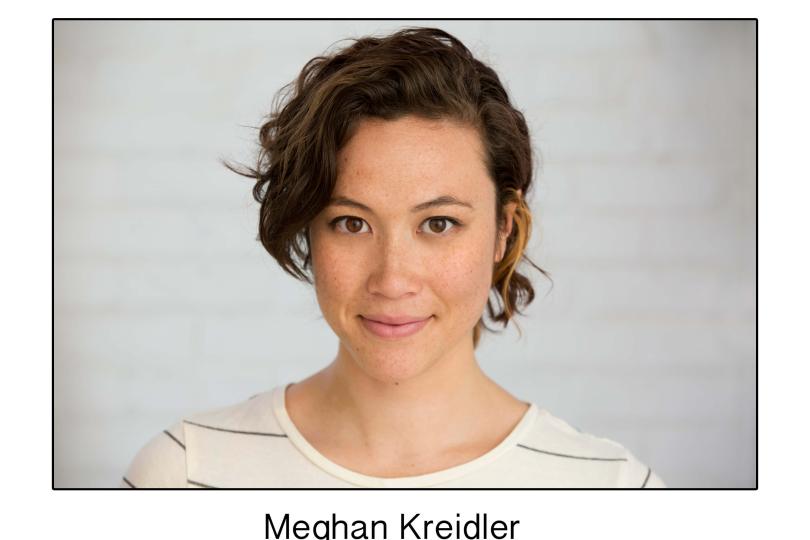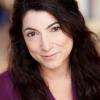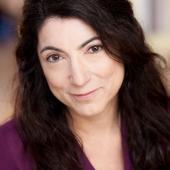Interview with Meghan Kreidler

Meghan Kreidler talks to Minnesota Playlist’s Kit Bix about performing rom com in Theater Mu’s Hot Asian Doctor Husband, rehearsal giggling, theater education and a bunch of other pretty interesting stuff.
KB: Are the Twin Cities home?
Somewhat. I was born in Minnesota and then my family moved around the states -- Texas, Georgia, Massachusetts. By the time I was 11 we had moved back to Minnesota and I’ve been living in Minneapolis for the last 10 years.
KB: Your onstage presence is famously powerful. Is that ability to fill up the space something you cultivated or did it come naturally?
I’ve always felt comfortable on stage and being in front of people, but I’m constantly trying to tamper with how I’m focusing my energy. I know I’m good at being loud and bold with movement, but I find it more difficult to find that same type of energy in small, quiet gestures. Every piece and character requires something different, but I find as I get older and I gain more experience that doing less is often better. Trusting that you are enough. It’s a constant exploration.
KB: You’re a graduate of the UM/Guthrie BFA program. Can we talk about that experience candidly? What were the most valuable things you learned there? What were the pluses and what, if any, were the less effective aspects? Looking back from where you are now, and given the realities of the actor’s life, how would you advise an aspiring actor coming out of high school who is trying to choose between attending a theater BFA program or following a different path to theater work?
For me the program at the U of M was perfect. It was incredibly immersive and intense and coming out of a public school where I did a lot of theatre and arts activities, it was amazing to finally be able to focus all of my energy into the thing that I knew I wanted to be doing. The greatest tool I was given in school was the ability to examine and really speak classical text. I don’t know if I would have been able to achieve that kind of education on my own. I operate very well with structure, otherwise I can have trouble self directing myself. The program at the U of M really forces you to be disciplined as an actor, but it also gives you a lot of opportunity to explore. I think if you’re graduating high school and interested in pursuing a BFA-like program you should be ready to put in the work. You really get out of it what you put into it. But you’re also taught lessons while you’re in school that sometimes don’t become fully realized until you’re out of school. I feel like my education there really gave me a great foundation and jumping off point to be successful.
I will say that because of the classical nature of the program there tends to be a lot of focus on plays written by white men and the western theatre cannon in general. I think as the newer classes come in and the companies are becoming more and more diverse, the programming is having to adjust. The theatre world is changing a lot as far as the stories being told and the voices that need to be heard; going to a classical theatre program as a person of color can often give you this false feeling, like you’re going to have to play white people the rest of your life or something. I didn’t really realize there was a world outside of that for me until I did a show with Mu. I think kids are way more self-aware now though and, from what I’ve heard, the program is also taking these things into consideration.
I think every person’s path is different though and there’s no right way to pursue anything. I think if you want to do something enough you will find a way to make it happen. Obviously having an education can be helpful and give you certain connections, but there’s really no calculated way of pursuing an artistic life.
KB: This is what – your fifth show with Mu? Can you talk about your relationship with Theater Mu? What is its place in your career? In your life?
Mu has always been a place to call home. I always feel the most at ease and comfortable in my skin when I’m working with Theater Mu, and I don’t think I need to explain why. Mu plays such a huge role in my career in the Twin Cities. I was given these amazing opportunities early on to play roles that were so close to who I am as well as roles that I don’t think I’d ever get cast as at other theatres. When you work with Mu as an Asian-American actor you are seen in a way that you don’t always get to be seen as. I used to believe that being Asian-American as an actor would set me back and prevent me from having certain opportunities; Mu is a place that gives you value as an artist and tells you that you can be anything and more.
KB: Hot Asian Doctor Husband is a “millennial rom com about interracial dating.” Some people think, oh well, rom coms are easier for actors than “serious” roles in “serious” plays. Do you think that’s the case? What are the challenges of playing the romantic lead in a rom com like this one?
I definitely disagree that it’s easier. This play is actually really hard for me, and I think I’m going to be working on figuring it out until the day we close. As the lead in a show like this you’ve really gotta ground yourself in the reality of the character’s situation. You can never comment on the comedy or wink at it--you really have to believe what you’re saying and doing and the comedy comes as a result of that. Leah Nanako Winkler is such an amazing playwright and people will be so thrilled to hear dialogue and witness situations that resemble our modern lives so well. But this piece also needs to strike a certain tone and that tone can easily be misinterpreted. It isn’t like a movie--there are still certain theatrical elements and heightened aspects of a piece like this that need to land in order for an audience to experience its full power.
KB: I got to glance at the script. Hot Asian Doctor Husband is extremely funny. Does the cast get giggly rehearsing?
Oh my gosh, yes. I think the scenes I have with my white boyfriend are some of the funniest in the play, and the reason we get giggly is because these characters are being so genuine and serious about what they’re saying and then you actually hear what they’re saying and it’s just so funny. Our job is to not laugh so that the audience can have that experience, but I will say in some of these scenes it’s really hard!!!
KB: So this is from the promotional copy for Hot Asian Doctor Husband: “Afraid that she's whitewashing her Asian culture, Emi, a twenty-something biracial woman, dumps her perfect white boyfriend in pursuit of a hot Asian doctor husband. But nobody is what they seem to be in this highly theatrical comedy that asks the question: is love truly blind?” So, would ‘Is love is strong enough to overcome history?’ be an accurate paraphrase?
Hmmm, I think you’re definitely touching on something with that. I don’t think the play is necessarily answering the question in either way, and I don’t want to give too much away. But I do think these characters, particularly Emi and her “perfect” white boyfriend, are experiencing a clash in their culture and experiences that is much more complex than transcendent love; I don’t think love can always transcend these barriers.
KB: You’re Emi in the play. Where is she in on the scale between romantic and pragmatic at the outset and does she shift? What’s holding her back from believing? Or is that too personal a question for Emi?
Well Emi is really operating out of grief this entire play. I think she uses the idea of romance as a way to shield herself from actually experiencing her grief in its entirety. It’s the aspect of the play that really resonates with me--seeking out sex and romance as a way to distract ourselves from the more important issues at hand. What are the things that we bury inside of ourselves and the things we try to do to feel something in place of that?
KB: Do have bucket list? What’s at the top – what’s your dream role? Or has it not been written yet?
I don’t have a dream role, but I’ve definitely played roles that have been a dream and I’m more interested in having types of experiences. I’ve really been trying to be more intentional about the type of work I’m going to do, not only based on the role but the experience that I’m likely to have--that is honestly what is most important to me right now.
KB: Are you getting everything you need as an artist in the Twin Cities? What are the advantages of working here and what are the obstacles? Is there anything you hunger for that you’re not getting locally?
Right now I feel pretty good about being an artist here. It’s really nice because I’ve been able to find a balance between playing music and doing theatre and I don’t know if I’d be able to find that, at least not right away, anywhere else. It would be hard to leave here because I’ve built so much for myself in this town and this town has been really good to me. I don’t believe that going somewhere else and pursuing “bigger” dreams will necessarily make me happier. I continue to be challenged and to work with amazing artists and that’s what I find most important. It’s so easy to want more or expect more for yourself, and I am very interested in growth in that way, but I’m also really trying to focus on enjoying everything that I have right now. Once you start having success it can be really easy to get side tracked with “what’s next?” I want to enjoy where I am right now.




